高二英语Module6 Unit2教案 牛津英语
牛津高中英语Module6,Unit2全单元教案

牛津高中英语Module 6, Unit 2全教案What is happiness to you?Welcome to the unitTeaching goalsEnable the students to state their opinions about happiness, and talk about how to help someone who is unhappy.Teaching important and difficult pointsTo encourage the students to give opinions on happiness and give their reasons.Teaching methodsIndividual work,and group workTeaching aidsMultimedia and blackboardTeaching procedure and waysStep 1 Greetings and lead-inT: Are you happy today?S: I got an A in this exam, so I feel very happy.T: You did a good job.S: I feel unhappy, because I always feel under pressure in my study. Although I study very hard, I still can not catch up with others.T: Do not lose heart. Just as the saying goes: where there is a will, there is a way. I believe if you continue to study like this, you will make progress.S: I feel happy today. We will have a family get-together tonight. I look forward to it!T: In your class, some feel happy, while others do not. So what happiness is on the earth, and how to become happy? Have you ever thought about that before?Ss: Yes! /No!T: Well. It does not matter. You will find much about that after learning this unit.Step2: PresentationsT: Ok! Please open your book to page 17! Let us look at the pictures. I’d like to divide you into 6 groups, and each group focuses on one picture. Use your common knowledge to describe each picture.T: Time is up! Are you ready?Ss: Yes!T: Group 1, please!S: In the picture, a girl is painting on the river side. The water is blue and calm. The scenery is so beautiful that the girl is totally attracted. And she wants to express happiness by painting it.T: Very good. Ok, group 2, what about you?S:T: What do you think of his description?Ss: Wonderful!T: I agree with you. Ok, it’s time for group 4. Any volunteer?S:T: Yes! That is it! Very good! Next group?S:T: Now, group 6?S:T: Wonderful!Step 3 DiscussionT: Up to now, we have talked about the six pictures. Now, discuss the questions below in groups of four.T: Ok, time is up, are you ready?Ss: Yes!T: We all know that reasons for happy are quite different. But, are there any things that can make everyone happy?S:T: Very good opinion. I agree with you. When we reach our goals, we will feel happyS:T: Good.S:T: Wonderful! Just now, we all stated some things that may make everyone happy. Everyone did a good job. Now, let us move on to next question: How to help our unhappy friends?S:T: That is it! And I still remember, just now, some said he was unhappy because he felt under pressure in study. Do you think that he will make progress in the future?Ss: Of course. We all believe that!T: Everyone can do things well with support from friends.S:T: Good idea! Any others?S: I will say with my unhappy friends, too. I will listen to whatever he/ she tells me. If possible, I will help him/her find out the problems and give some suggestions.T: That is so great of you!Step 4: SummaryT: Today, we have discussed about happiness, and all of you have done a good job. I feel so happy with you. At the end of this class, I hope every one of you will be happy every day. I also hope you can make everyone around you happy. So much for today.Stp5: HomeworkPreview Reading partReadingObjectives:1.To help Ss get a general idea about the text.2. To make Ss become familiar with the detailed information about the text.3. To help Ss master Reading Strategy.Teaching important points:1.How to make the students understand the passage better.2.How to help the students finish all the exercises.3.How to help the students develop their creative, comprehensive and consolidating abilities. Interaction Patterns: Teachers -class, individuals, pairsTeaching Aids:1. The multimedia2. The blackboardProcedures for teaching:Step1: lead-in1.Tell students that they are going to read an interview from a TV programme about happiness. Ask students how much information they know about Sang Lan. If possible, you can ask students to collect some relevant information before class. You may conduct the activity as follows: Today we are going to talk about a special girl named Sang Lan, who used to be a successful gymnast. Can you search for more information about this girl?2. Ask students to exchange the background information about Sang Lan they have found with each other. Ask students to think about Sang Lan’s experiences and answer the following questions:Different people find happiness and fun in different things. There are certainly no criteria assessing which way of being happy is the best. Do you think Sang Lan had had a happy life before she was injured?Do you think Sang Lan has a happy life now?What would you do if you had the same problem?Encourage students to discusss freely their true feelings about Sang Lan’s story.3. Ask students to think about the following question:Suppose you had a chance to talk face to face with Sang Lan, what would you like most to ask her about?The following are suggested answers:Childhood and school educationThings or experiences that had left her the deepest impression before the accidentReasons for learning gymnasticsThings that encourage her during hard timesCurrent physical conditionExpectations for futureFuture career plansAttitudes towards life, success and failureStep2: First readingFind the answers to Part AStep3: Read the text again and complete Parts C1 and C2.Step4: cloze (Ep21)Step5: discussion. (F)Step6: Language points:1. goal 1)目的,目标ach ieve/reach/realize one’s goal实现目标;2)(球戏等的)得分,赢分make/score/get a goal 得一分2. times 时代;时势;境况(常用复);the times 当代The times are different. 时代不同了。
最新-高二英语 Unit2教案 牛津版选修6 精品

Unit 2 What is happiness to you? Ⅰ.单元教学目标Ⅱ.目标语言Ⅲ. 教材分析与教材重组1. 教材分析本单元以What is happiness to you 为话题,展开什么是幸福、如何寻找幸福的讨论。
通过阅读一篇采访,使学生了解体操运动员桑兰是如何面对困难,以及如何在困境中寻找幸福的。
同时让学生了解采访提问的技巧以及采访文章的阅读策略。
运用所学的词语、结构正确表达自己的心情,学生将综合运用各种技能(确定问题,通过提问获取信息,讨论解决方案)针对网站上的文章提出建议,最终完成该任务。
课堂活动是写一篇关于对幸福的理解的文章,学生将先阅读两篇文章,了解不同的人对幸福的不同理解,然后完成写作任务。
通过本单元的学习学生能够正确认识、珍惜幸福,及时调试自己的心情,积极面对问题、解决问题,以利于自己身心的健康发展。
1.1 Welcome to the unit 板块提供了六幅图画,要求学生根据自己对每幅图画的理解用一两句话加以描述,然后讨论并回答相关问题。
1.2 Reading 包括A、B、C1、C2、D、E、F 7部分。
A 所设计的三个问题要求学生通过快速阅读了解这篇采访的主题,被采访人的姓名以及著名运动员桑兰的一些个人基本信息; B 部分要求学生通过阅读对一名心理学家的采访,了解体操运动员桑兰是如何在困境中寻找幸福的; C1是对采访细节内容的考查; C2 要求学生通过连线,理清有关桑兰故事的发展脉络,同时也可以看作是对文章细节内容的考查; D 训练学生根据课文正确理解新的词汇与表达的能力; E是一篇关于桑兰的新闻报道,要求学生能够根据采访内容以及该部分的上下文,正确选填词语。
F设计了与采访内容相关的三个问题,要求学生展开讨论,以获得对文章内容的更进一步了解。
Reading Strategy 介绍了采访文章的阅读策略。
1.3 Word power 要求学生运用正确的词汇与习语来表达情绪;所设计的三个练习在于检测学生灵活运用这些词汇的能力。
牛津英语模块6unit2教案
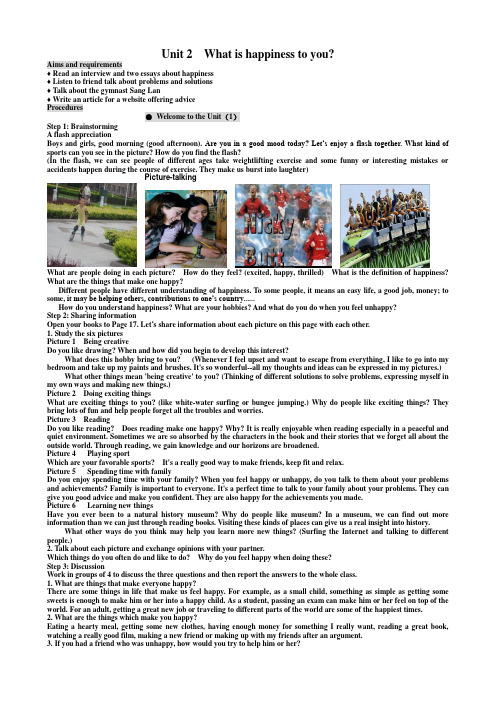
Unit 2 What is happiness to you?Aims and requirements♦ Read an interview and two essays about happiness♦ Listen to friend talk about problems and solutions♦ Talk about the gymnast Sang Lan♦ Write an article for a website offering adviceProcedures●Welcome to the Unit(1)Step 1: BrainstormingA flash appreciationBoys and girls, good morning (good afternoon). Are you in a good mood today? Let’s enjoy a flash together. What kind of sports can you see in the picture? How do you find the flash?(In the flash, we can see people of different ages take weightlifting exercise and some funny or interesting mistakes or accidents happen during the course of exercise. They make us burst into laughter)Picture-talkingWhat are people doing in each picture? How do they feel? (excited, happy, thrilled) What is the definition of happiness? What are the things that make one happy?Different people have different understanding of happiness. To some people, it means an easy life, a good job, money; to some, it may be helping others, contributions to one’s country......How do you understand happiness? What are your hobbies? And what do you do when you feel unhappy?Step 2: Sharing informationOpen your books to Page 17. Let’s share information about each picture on this page with each other.1. Study the six picturesPicture 1 Being creativeDo you like drawing? When and how did you begin to develop this interest?What does this hobby bring to you? (Whenever I feel upset and want to escape from everything, I like to go into my bedroom and take up my paints and brushes. It's so wonderful--all my thoughts and ideas can be expressed in my pictures.) What other things mean 'being creative' to you? (Thinking of different solutions to solve problems, expressing myself in my own ways and making new things.)Picture 2 Doing exciting thingsWhat are exciting things to you? (like white-water surfing or bungee jumping.) Why do people like exciting things? They bring lots of fun and help people forget all the troubles and worries.Picture 3 ReadingDo you like reading? Does reading make one happy? Why? It is really enjoyable when reading especially in a peaceful and quiet environment. Sometimes we are so absorbed by the characters in the book and their stories that we forget all about the outside world. Through reading, we gain knowledge and our horizons are broadened.Picture 4 Playing sportWhich are your favorable sports? It's a really good way to make friends, keep fit and relax.Picture 5 Spending time with familyDo you enjoy spending time with your family? When you feel happy or unhappy, do you talk to them about your problems and achievements? Family is important to everyone. It's a perfect time to talk to your family about your problems. They can give you good advice and make you confident. They are also happy for the achievements you made.Picture 6 Learning new thingsHave you ever been to a natural history museum? Why do people like museum? In a museum, we can find out more information than we can just through reading books. Visiting these kinds of places can give us a real insight into history.What other ways do you think may help you learn more new things? (Surfing the Internet and talking to different people.)2. Talk about each picture and exchange opinions with your partner.Which things do you often do and like to do? Why do you feel happy when doing these?Step 3: DiscussionWork in groups of 4 to discuss the three questions and then report the answers to the whole class.1. What are things that make everyone happy?There are some things in life that make us feel happy. For example, as a small child, something as simple as getting some sweets is enough to make him or her into a happy child. As a student, passing an exam can make him or her feel on top of the world. For an adult, getting a great new job or traveling to different parts of the world are some of the happiest times.2. What are the things which make you happy?Eating a hearty meal, getting some new clothes, having enough money for something I really want, reading a great book, watching a really good film, making a new friend or making up with my friends after an argument.3. If you had a friend who was unhappy, how would you try to help him or her?In this case, I will try to be a good listener and understand what has made him or her so upset. Offer some advice if necessary. Invite him to go outside for a walk or go shopping together to cheer him upStep 4: HomeworkRead the two articles on P112-113.Prepare the reading part.●Welcome to the unit(2)1. These people are all doing things that make them happy. (P17) 这些人都在做让他们高兴的事件。
高二英语选修六_Unit2_Reading_公开课教学设计(三)
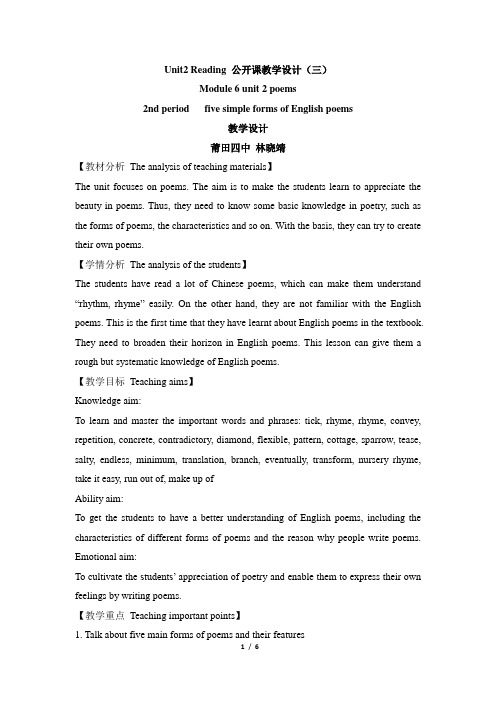
Unit2 Reading 公开课教学设计(三)Module 6 unit 2 poems2nd period five simple forms of English poems教学设计莆田四中林晓靖【教材分析The analysis of teaching materials】The unit focuses on poems. The aim is to make the students learn to appreciate the beauty in poems. Thus, they need to know some basic knowledge in poetry, such as the forms of poems, the characteristics and so on. With the basis, they can try to create their own poems.【学情分析The analysis of the students】The students have read a lot of Chinese poems, which can make them understand “rhythm,rhyme”easily. On the other hand, they are not familiar with the English poems. This is the first time that they have learnt about English poems in the textbook. They need to broaden their horizon in English poems. This lesson can give them a rough but systematic knowledge of English poems.【教学目标Teaching aims】Knowledge aim:To learn and master the important words and phrases: tick, rhyme, rhyme, convey, repetition, concrete, contradictory, diamond, flexible, pattern, cottage, sparrow, tease, salty, endless, minimum, translation, branch, eventually, transform, nursery rhyme, take it easy, run out of, make up ofAbility aim:To get the students to have a better understanding of English poems, including the characteristics of different forms of poems and the reason why people write poems. Emotional aim:To cultivate the students’ appreciation of poetry and enable them to express their own feelings by writing poems.【教学重点Teaching important points】1. Talk about five main forms of poems and their features2. Understand the main purpose of writing poems.【教学难点Teaching difficult points】1. Analysis the features of different forms of poems.2. To enable the students to create their own poems.【教学方法Teaching methods】Discussion and cooperation【教学工具Teaching tools】Multimedia. Chalk and blackboard【教学过程Teaching procedures】Step 1 Lead-in1. Enjoy a nursery rhyme “twinkle” to find some features of nursery rhymes.Q: This is a nursery rhyme. It’s also a form of poems. Do you think it’s easy to learn and recite? Why?A: Nursery rhymes feature in rhyme, repetition, and strong rhythm, through which we can get a feel for the poem’s sound.2. some tips about how to read a poem.get a feel for its sound (esp. rhyme /rhythm/repetition)get a closer understanding of what the poem is trying to convey.(theme)设计说明:这样的导入紧扣主题,通过让学生听并跟唱一首耳熟能详的英文诗,激发学生的求知欲和好奇心,并教会学生应从哪些方面去欣赏诗歌,为下一步的诗歌教学作了很好的铺垫。
Module6 Unit2教案(精编文档).doc
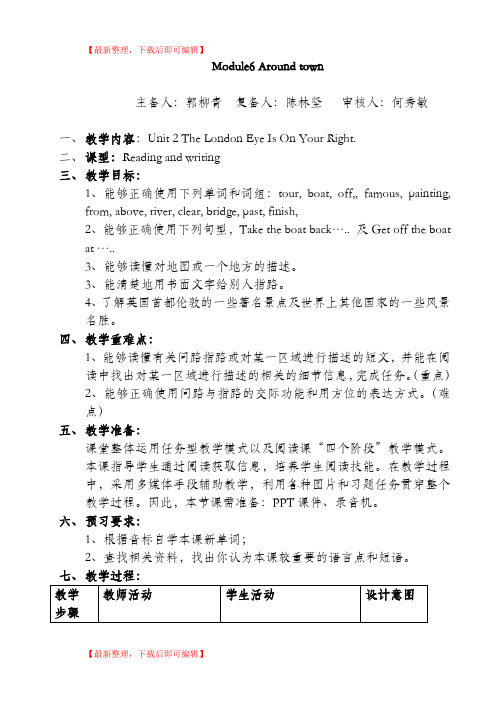
【最新整理,下载后即可编辑】Module6 Around town主备人:郭柳青复备人:陈林坚审核人:何秀敏一、教学内容:Unit 2 The London Eye Is On Your Right.二、课型:Reading and writing三、教学目标:1、能够正确使用下列单词和词组:tour, boat, off,, famous, painting,from, above, river, clear, bridge, past, finish,2、能够正确使用下列句型,Take the boat back….. 及Get off the boatat …..3、能够读懂对地图或一个地方的描述。
3、能清楚地用书面文字给别人指路。
4、了解英国首都伦敦的一些著名景点及世界上其他国家的一些风景名胜。
四、教学重难点:1、能够读懂有关问路指路或对某一区域进行描述的短文,并能在阅读中找出对某一区域进行描述的相关的细节信息,完成任务。
(重点)2、能够正确使用问路与指路的交际功能和用方位的表达方式。
(难点)五、教学准备:课堂整体运用任务型教学模式以及阅读课“四个阶段”教学模式。
本课指导学生通过阅读获取信息,培养学生阅读技能。
在教学过程中,采用多媒体手段辅助教学,利用各种图片和习题任务贯穿整个教学过程。
因此,本节课需准备:PPT课件、录音机。
六、预习要求:1、根据音标自学本课新单词;2、查找相关资料,找出你认为本课较重要的语言点和短语。
七、教学过程:Unit 2 The London Eye Is On Your Right in the middle ofget offget on达标训练题一、根据中文提示完成句子:1.他们中的大部分人通过了这次考试。
_________ __________ them have passed the exam.2.沿着这条街一直走,然后向右拐。
Go ________ _______ this street and then _________ ________.3.学习最好的方式是上课认真听讲。
牛津高二英语Module 6 Unit 2 Reading课件牛津英语选修6
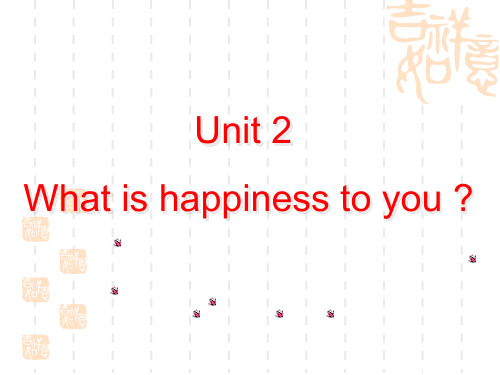
The world was amazed by the way
she remained cheerful.(p 18,lines 16-17)
that
= ------ by the way
she ------
She remains cheerful.
Leonardo DiCaprio
Back to China
to study journalism to host a sports programme to hope to play table tennis
Getting up from where you fall is the most ordinary thing for a gymnast. And it’s my motto. I’ll arrange my time scientifically and work hard on my studies so as to be a winner in life.
Ready to help others
Have a young heart
Harmony with all kinds
Have a good sense of humor
Stay calm in all situations
Willing to forgive Make true friends
( F )6. Sang Lan broke her nleegcsk and will never walk again.
( T )7. Leonardo DiCaprio visited Sang Lan in the hospital.
高二英语Module6 Unit2 What is happiness to you教案 牛津英语

高二英语Module6 Unit2 What is happiness to you教案Project Language points★It is nice to do sth.句型: It is/ becomes +adj. + to do sth. (it 为形式主语,动词不定式为真正主语)e.g. It is necessary for us to master a foreign language.精通一门外语,对我们来说是必要的。
It is necessary to get ready for the test.★look back on 回首;回忆;回顾e.g. 1) He used to sit there, looking back on his happy childhood.他过去常常坐在那里,回忆自己幸福的童年。
2) When he saw the old photos, he couldn’t help looking back on thedays he spent with his grandpa.当看到旧照片时,他情不自禁地想起跟爷爷一块儿度过的日子。
相关短语:look on/ upon …as…把……看作look out 当心,小心;留神look forward to 盼望look up 查阅;仰视;改善,好转★encouragement n. [U] the act of encouraging to do sth 鼓舞,激励;[C] sth. that encourages sb. 起激励作用的事物e.g. 1) Her words was a great encouragement to them.她的话对他们是极大的鼓舞。
2) With a little encouragement from his parents, he could have done better. 父母给点激励的话,他会做得更好。
牛津译林版高中英语模块6 Unit 2 Reading 教学设计2
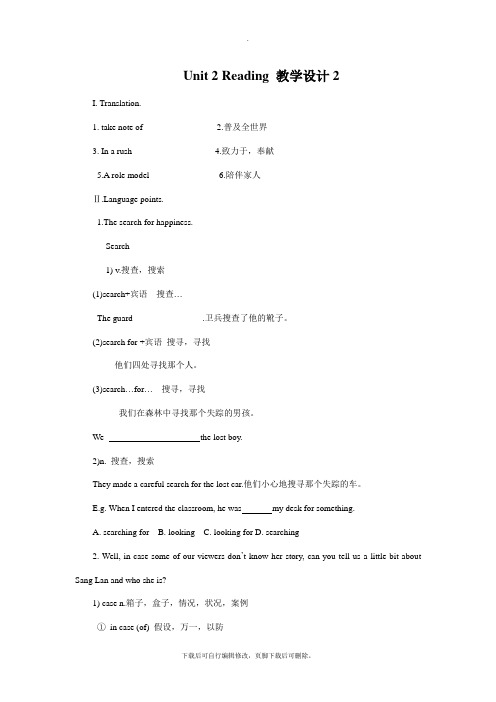
Unit 2 Reading 教学设计2I. Translation.1. take note of2.普及全世界3. In a rush4.致力于,奉献5.A role model6.陪伴家人Ⅱ.Language points.1.The search for happiness.Search1) v.搜查,搜索(1)search+宾语搜查…The guard .卫兵搜查了他的靴子。
(2)search for +宾语搜寻,寻找他们四处寻找那个人。
(3)search…for…搜寻,寻找我们在森林中寻找那个失踪的男孩。
We the lost boy.2)n. 搜查,搜索They made a careful search for the lost car.他们小心地搜寻那个失踪的车。
E.g. When I entered the classroom, he was my desk for something.A. searching forB. lookingC. looking forD. searching2. Well, in case some of our viewers don’t know her story, can you tell us a little bit about Sang Lan and who she is?1) case n.箱子,盒子,情况,状况,案例①in case (of) 假设,万一,以防万一发生火灾,给消防部门打。
call the fire department.②in that/this case 假设那样/这样的话Sometimes feta is very salty, in which case no salt needs to be added.有时,羊奶干酪很咸。
如果这样的话,就不必加盐了。
③in no case决不In no case shall we allow smoking in the classroom..④In any case2)a bit(1) a bit 可当做程度副词来使用,意思与a little一样。
高二英语教案:牛津版高二英语模块6unit 2教案3

Unit 2 What is happiness to you?Part One Teaching Design第一部分教学设计Aims and requirements♦ Read an interview and two essays about happiness♦ Listen to friend talk about problems and solutions♦ Talk about the gymnast Sang Lan♦ Write an article for a website offering adviceProcedures●Welcome to the UnitStep 1: BrainstormingA flash appreciationBoys and girls, good morning (good afternoon). Are you in a good mood today? Let’s enjoy a flash together. What kind of sports can you see in the picture? How do you find the flash?(In the flash, we can see people of different ages take weightlifting exercise and some funny or interesting mistakes or accidents happen during the course of exercise. They make us burst into laughter)Picture-talkingWhat are people doing in each picture? How do they feel? (excited, happy, thrilled) What is the definition of happiness? What are the things that make one happy?Different people have different understanding of happiness. To some people, it means an easy life, a good job, money; to some, it may be helping others, contributions to one’s country......How do you understand happiness? What are your hobbies? And what do you do when you feel unhappy?Step 2: Sharing informationOpen your books to Page 17. Let’s share information about each picture on this page with each other.1. Study the six picturesPicture 1 Being creativeDo you like drawing? When and how did you begin to develop this interest?What does this hobby bring to you? (Whenever I feel upset and want to escape from everything, I like to go into my bedroom and take up my paints and brushes. It's so wonderful--all my thoughts and ideas can be expressed in my pictures.)What other things mean 'being creative' to you? (Thinking of different solutions to solve problems, expressing myself in my own ways and making new things.)Picture 2 Doing exciting thingsWhat are exciting things to you? (like white-water surfing or bungee jumping.) Why do peoplelike exciting things? They bring lots of fun and help people forget all the troubles and worries. Picture 3 ReadingDo you like reading? Does reading make one happy? Why? It is really enjoyable when reading especially in a peaceful and quiet environment. Sometimes we are so absorbed by the characters in the book and their stories that we forget all about the outside world. Through reading, we gain knowledge and our horizons are broadened.Picture 4 Playing sportWhich are your favorable sports? It's a really good way to make friends, keep fit and relax. Picture 5 Spending time with familyDo you enjoy spending time with your family? When you feel happy or unhappy, do you talk to them about your problems and achievements? Family is important to everyone. It's a perfect time to talk to your family about your problems. They can give you good advice and make you confident. They are also happy for the achievements you made.Picture 6 Learning new thingsHave you ever been to a natural history museum? Why do people like museum? In a museum, we can find out more information than we can just through reading books. Visiting these kinds of places can give us a real insight into history.What other ways do you think may help you learn more new things? (Surfing the Internet and talking to different people.)2. Talk about each picture and exchange opinions with your partner.Which things do you often do and like to do? Why do you feel happy when doing these?Step 3: DiscussionWork in groups of 4 to discuss the three questions and then report the answers to the whole class.1. What are things that make everyone happy?There are some things in life that make us feel happy. For example, as a small child, something as simple as getting some sweets is enough to make him or her into a happy child. As a student, passing an exam can make him or her feel on top of the world. For an adult, getting a great new job or traveling to different parts of the world are some of the happiest times.2. What are the things which make you happy?Eating a hearty meal, getting some new clothes, having enough money for something I really want, reading a great book, watching a really good film, making a new friend or making up with my friends after an argument.3. If you had a friend who was unhappy, how would you try to help him or her?In this case, I will try to be a good listener and understand what has made him or her so upset. Offer some advice if necessary. Invite him to go outside for a walk or go shopping together to cheer him upStep 4: HomeworkRead the two articles on P112-113.Prepare the reading part.●Reading The search for happinessStep 1: Lead-inLet’s enjoy a video. It can make us feel very happy and in good mood. And we can see most ordinary healthy people around us live a happy, meaningful and colourful life. We work and live with smiles every day. But how do you know disabled people stay happy in their life? Today we are going to talk about a special girl named Sang Lan, who used to be a successful gymnast. What do you know about this girl?1. Different people find happiness and fun in different things. There are certainly no criteria assessing which way of being happy is the best. Do you think Sang Lan had had a happy life before she was injured?Do you think Sang Lan has a happy life now?What would you do if you had the same problem?2. Suppose you had a chance to talk face to face with Sang Lan, what would you like most to ask her about?The following are suggested answers:--- childhood and school education--- things or experiences that had left her the deepest impression before the accident--- reasons for learning gymnastics--- things that encourage her during hard times--- current physical condition--- expectations for future--- future career plans--- attitudes towards life, success and failureStep 2: Fast reading for general ideasThe reading text is an interview from a TV programme about happiness. Dr Brain, a psychologist who studies happiness, is interviewed in a television talk show and tells a story about a brave girl called Sang Lan.Answers1. Happiness2. Dr Brain.3. In Ningbo, China in 1981.1. Read the passage again and complete Part C1. Questions in Part C1 are to check your reading comprehension by making correct judgments of the statements.2. Listen to the tape and complete C2. Questions in Part C2 are for students to note some specificMore relevant information in the interview which shows Sang Lan ’s personalityBefore going to hospital· being successful in her sport when she was young· being described as energetic, happy and hard-working·working towards something special· trying to make her parents proudWhile staying in hospital·being in good spirits·thinking about what she could do to get better·being proud of the things she had accomplished·feeling happy to be alive, and lucky to have the rest of her life to learn new thingsAfter leaving hospital·studying journalism at Beijing University·hosting a sports show about the 2008 Beijing Olympics·looking forward to playing table tennis in the special Olympics for disabled people in 2008·thinking about positive things and staying optimistic·believing that keeping busy helps her stay positiveStep 4: Practice1. Complete Part DFind these words and expressions in the interview. Guess their meanings from the context. Thenmatch them with the correct definitions.2. Complete Part ERead this newspaper article about Sang Lan. Complete it with the words below.3. Let’s read the Reading strategy on page 19. Do you know what an interview means? An interview is a formal meeting at which one person asks another person a series of questions on a topic. When reading or watching an interview, you should pay attention to the topic, the opinions related to the topic, the questions asked and the answers to the questions.Step 5: Post-reading activitiesThink about the following questions again.What is happiness?What is the real value of being alive?Does being healthy and wealthy mean happiness?Does being respected and well-liked mean happiness?2. Have a debate. The topic is “Sang Lan was happier before the accident than she is now.”3. Go over Part F in pairs and continue the dialogue after the example.Step 6: Language Points1. Finish Parts A1 and A2 on page 108 in Workbook.2. Go over the reading passage.●Word powerStep 1: BrainstormingIn this section we’ll learn the words and idioms used to describe emotions and feelings. Now I’d like you to answer the following questions:What words do you know can express happiness?Apart from happiness, what other types of emotions do you know?Can you think of some words that can express these kinds of feelings?(love joy excitement hate fear jealousy delight surprise astonishment frustration depression contentment satisfaction concern worry fury curiosity ) Step 2: Vocabulary learning1. Read the instructions on page 22 and study the examples listed in the table.2. Write the adjective forms of other nouns related to emotion.ReferenceNouns Adjectivesastonishment astonisheddelight delightedfury furiouscuriosity curioussatisfaction satisfieddepression depressedamazement amazeddisappointmemt disappointedStep 3: Practice1. Let’s focus on Part A. Circle the right word according to each different situation.Step 4: CompetitionHow many emotional words do you know? Now I’ll divide you into several groups. You’ll have a competition to see which group has the most words. In the end you need to group emotional words into three different categories: happiness, sadness and anger.·Words describing happiness:Noun forms: joy, happiness, delightAdjective forms: joyful, happy, delighted·Words describing sadness:Noun forms: sadness, depressionAdjective forms: sad, depressed·Words describing anger:Noun forms: anger, furyAdjective forms: angry, furiousStep 5: Vocabulary extension1. Choose the correct word to complete each sentence.①I'm not_____(satisfied, satisfaction) with what I've done. I can't get_____ (satisfied, satisfaction) from it. (satisfied; satisfaction)②I was _____ (amazed, amazement) by the change in his appearance. All of us looked at him in_____ (amazed, amazement). (amazed; amazement)③The boy is _____ (curious, curiosity) about everything. His burning_____ (curious, curiosity) inspires him to learn more. (curious; curiosity)2. Do part C. In the English language, there are some idioms about emotions. Guess their3. Reading comprehensionThere are some very good things about open education. This way of teaching allows the students to grow as people, and to develop their own interests in many subjects. Open education allows students to be responsible for their own education, as they are responsible for what they do in life. Some students do badly in a traditional classroom. The open classroom may allow them to enjoy learning. Some students will be happier in an open education school. They will not have to worry about grades or rules. For students who worry about these things a lot, it is a good idea to be in an open classroom.But many students will not do well in an open classroom. For some students, there are too few rules. These students will do little in school. They will not make good use of open education. Because open education is so different from traditional education, these students may have a problem getting used to making so many choices. For many students it is important to have some rules in the classroom. They worry about the rules even when there are no rules. Even a few rules will help this kind of students. The last point about open education is that some traditionalteachers do not like it. Many teachers do not believe in open education. Teachers who want to have an open classroom may have many problems at their schools.You now know what open education is. Some of its good points and bad points have been explained. You may have your own opinion about open education. The writer thinks that open education is a good idea, but only in theory. In actual fact, it may not work very well in a real class or school. The writer believes that most students, but of course not all students, want some structure in their classes. They want and need to have rules. In some cases, they must be made to study some subjects. Many students are pleased to find subjects they have to study interesting. They would not study those subjects if they did not have to.1. Open education allows the students to ___________ .A. grow as the educated B.be responsible for their futureC. develop their own interests D.discover subjects outside class2. Open education may be a good idea for the students who__________.A.enjoy learning B.worry about gradesC.do well in a traditional classroom D.are responsible for what they do in life.3. Some students will do little in an open classroom because_________ .A.there are too few rules B.they hate activitiesC.open education is similar to the traditional education D.they worry about the rules 4. Which of the following is NOT mentioned in the passage?A.Some traditional teachers do not like it.B.Many teachers do not believe in open education.C.Teachers may have problems in open classrooms.D.The teacher’s feelings and attitudes are important to the students.5. Which of the following best summarizes the passage?A.Open education is a really complex idea.B.Open education is better than traditional education.C.Teachers dislike open education.D.The writer thinks that open education is a good idea in practice.Step 6: HomeworkPart C on page 114 in the Workbook.Prepare Grammar and usage.●Grammar and usageStep 1: General introduction and explanation to past and future tensePast tenseI. The simple past tense:It is often used to talk about something that happened in the past and is now finished.e.g. She worked late into night yesterday.II. The past continuous tense:The tense is to talk about something that happened in the past and continued for some time. e.g. She knew that as a famous dancer she was making her parents proud in those years.III. The past perfect tense:1. The past perfect tense is often used with the simple past tense. If one action happens beforeanother in the past, the past perfect tense is used.e.g. Upon entering the tomb, Carter’s lucky pet bird , which had led him to the place, was eaten by a snake.2. The past perfect tense is sometimes used in reported speeche.g. “We emptied the tomb of everything it contained,” said Carter.Carter said that they had emptied the tomb of everything it contained.3. The use of the past perfect tense simply indicates that an action comes before another past action, used with time expressions such as when, after, before, as soon as, until, by, for and alreadye.g. I had done my homework this morning before I went to the museum.Future tenseI. The form and usage of the simple future tense:1. will/shall do:表示将来发生的动作或出现的状态,shall仅与第一人称连用2. be going to do:表示主语计划打算的行动或看来就要发生的事情3. be doing:表示计划或安排好的动作(go, come, leave, begin 等动词)4. be to do:表示客观上计划或安排好的动作5. be about to do:表示即将发生的动作,一般不带时间副词或短语6. do:表示与安排,计划或时刻表有关的动作;或用于if, when等状语从句中代替will do. II. The usage of the future continuous tense:1. Talk about something that will be in progress at a certain time or over a period of time in the future. (讨论将来某个时间点或时间段正在进行的动作)e.g. Toby will not be in London next Tuesday. He will be climbing in the Himalayas.Toby will be climbing in the Himalayas all next week.Express future without intention. When it is used in this way, we want to indicate that something will happen naturally. It doesn’t imply that the speaker has arranged the action.(表示不包含说话者主观意愿的纯粹将来。
牛津译林版高中英语模块6 Unit 2 Task 教学设计
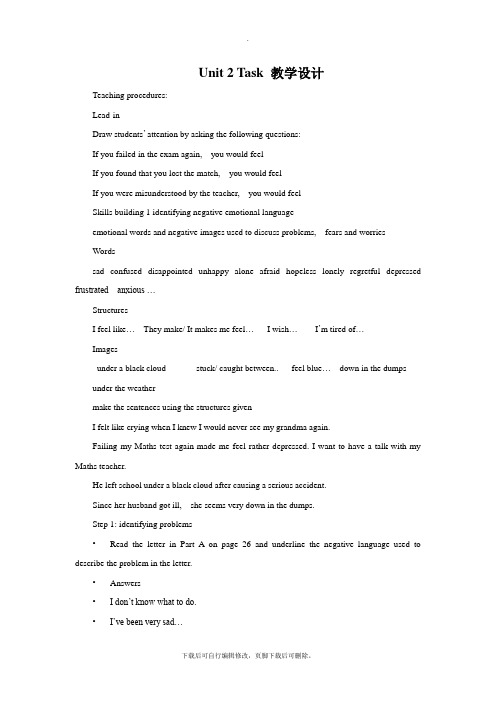
Unit 2 Task 教学设计Teaching procedures:Lead-inDraw students’ attention by asking the following questions:If you failed in the exam again, you would feel ________If you found that you lost the match, you would feel______If you were misunderstood by the teacher, you would feel______Skills building 1 identifying negative emotional languageemotional words and negative images used to discuss problems, fears and worriesWordssad confused disappointed unhappy alone afraid hopeless lonely regretful depressed frustrated anxious …StructuresI feel like…They make/ It makes me feel…I wish…I’m tired of…Imagesunder a black cloud stuck/ caught between.. feel blue…down in the dumps under the weathermake the sentences using the structures givenI felt like crying when I knew I would never see my grandma again.Failing my Maths test again made me feel rather depressed. I want to have a talk with my Maths teacher.He left school under a black cloud after causing a serious accident.Since her husband got ill, she seems very down in the dumps.Step 1: identifying problems•Read the letter in Part A on page 26 and underline the negative language used to describe the problem in the letter.•Answers•I don’t know what to do.•I’ve been very sad…•I feel caught between…•They make me feel like I’m a bad son.•I feel guilty…I’m so confused.•I’m really tired of feeling worried…•I wish I knew…•If you were Ma Jie, what would you do to solve the problem?B You decided to call Ma Jie to find more about his problems. Listen to what he saysand complete your notes below.C What reasons can you think Ma Jie will give?.Skills building 2: breaking a big question into smaller onesStep 2: discussing solutions•What do you think of Ma Ji e’s problem?•Answers work in pairs to make up a dialogue.Skills building 3:giving advice•guidelines of how to make advice clearer and more helpful to people who need itStep 3: writing an articlewrite an article about how Ma Jie solved his problem with the help of his parents, teachers and coach.discuss and list what you should write:for example:●Ma Jie’s problems●the possible solutions Ma Jie has thought of and the reasons why they didn’t work●the advice you gave to Ma Jie●the advice his parents, teachers and coach gave him and why it works●your opinion about the best way to solve problems that students have。
牛津译林版高中英语模块6 Unit 2 Welcome 教学设计

Unit 2 Welcome 教学设计ⅠBrainstorm1. Discuss with each other about what they think make them happy or unhappy.2. List their opinions on the blackboard.ⅡThese people are all doing things that make them happy.Group discussionDo you think there are some things that make everyone happy? What are they?What are the things which make you happy?If you had a friend who was unhappy, how would you tryto help him or her?ⅢOn happinessHappiness is______,With joy, sweetness, and excitement as its fruits.Happiness is_______, With gentleness, comfort and love as its furniture.Happiness is ________, Who teaches us to love, to sacrifice and own…Happiness is a hope plus the faith of you and me.Happiness is Spring's wind, Summer’s flowers , Autumn's fruits , and Winter's snow.Happiness is shapeless and invisible at all,We need to touch it with full hearts.ⅣPair work[来源:]Street interview.Do you feel happy? And what is happiness to you, in your opinion?Everyone has their own definition of happiness, may different from others. keep what is happiness in your mind as your own image and to enjoy your own happy life. Life is not what other people's thinking, is your inside feeling.ⅤLanguage points1. creative a.创造(性)的, 有创造力的The school encourages free expression in art, drama and creative writing.学校鼓励师生在艺术、戏剧和文学创作上自由发挥。
高二上英语培训单元教学设计-Module 6 Unit 2 poems(新课标版高二英语选修六教案教

单元重点内容与教学目标本单元的中心话题是诗歌。
听说读写等语言知识和语言技能主要围绕“诗歌”这一主题设计的。
文中涉及诗歌的韵律、节奏,并介绍了几种简单的不同内容和形式的诗歌。
本单元引导学生讨论这些内容,目的在于让他们了解诗歌的一些基本特征和写作方法,自己尝试写简单的诗歌,并学会欣赏这些优美的文学作品。
Warming up部分围绕诗歌这一话题设置了两个练习。
第一个练习引导学生回顾儿时所接触的诗歌;第二个练习引导学生探讨写诗的目的。
Pre-reading 部分主要让学生认识诗歌的种类和不同国家所赋诗歌的文化差异。
该部分设置了两个练习,第一个练习让写诗交流所喜爱的诗歌;第二个练习就阅读课文设计图表,让写诗从内容和写作风格两个方面认识阅读课文中的诗歌。
Reading 部分介绍了五种简单的英语诗歌共8首:儿歌节奏明快,韵律和谐、朗朗上口、不断重复、利于记忆,是语言学习的有效手段;清单诗,尤其是那些不断重复短语和节奏的诗歌,比较容易创作。
五行诗,顾名思义,由五行组成,寥寥数语,言简意赅。
俳句起源于日本,由17个音节组成。
唐诗,被英国等所借鉴,许多唐诗被译成英文,广为传诵。
Comprehending部分的真重点放在文中的几首诗歌上,要求提炼诗歌的主题,练习1要求选择自己喜爱的诗歌进行评述,练习2与3是对诗歌进行更深入地理解。
通过诵读感受押韵和节奏。
Learning about language部分安排的两个练习均与诗歌有关。
第一个练习通过从课文诗歌中找押韵的词帮助学生理解课文的生词和诗歌的韵脚;第二个练习学习构词发。
语法部分设置了两种类型的练习。
一类写诗或续诗;另一类是用所给词的适当形式填空。
这两个练习都是操练虚拟语气的用法。
Using language 部分综合训练听说读写的语言能力。
听、读和讨论部分把听力与阅读训练结合起来。
通过听理解诗歌内容,辨认写诗人的身份、诗歌的节律,并表达诗歌所激起的联想。
通过边打拍子边朗读、在欣赏中加深对诗歌的理解。
牛津译林版高中英语选修六M6U2Thesearchforhappiness

Thesearchforhappiness
(What)Whatishappiness?Tosome,happinessis________ _____.Toothers,happinessmeans__________.To______ ____,happinessmeans_____.
1.Toapplyreadingstrategyofaninterview;
2.Tounderstandthestoryandgiveasum mary;
3.Togiveareporton“Thesearchforhappi ness”
Whatishappinesstoyou?
wealth success friendship
Dr.Braintakes____S_a_n__g_L_a_n_g___asanexample.
ReadLine14-31andanswerquestions: 1.WhatwasSangLang? 2.Howdidherteammatesdescribeher? 3.Didshelivetogetherwithherparents? 4.Asangymnast,whatwashappinesstoher? 5.Howdidshewinherhappiness?
(Why)___________________________________ __________________________________________
__________________________________________
(How)_____________helps_____enjoyshappiness.Byfo cusingon____________,_______findshappinessinlife.
高二英语牛津版选修6unit2reading教案
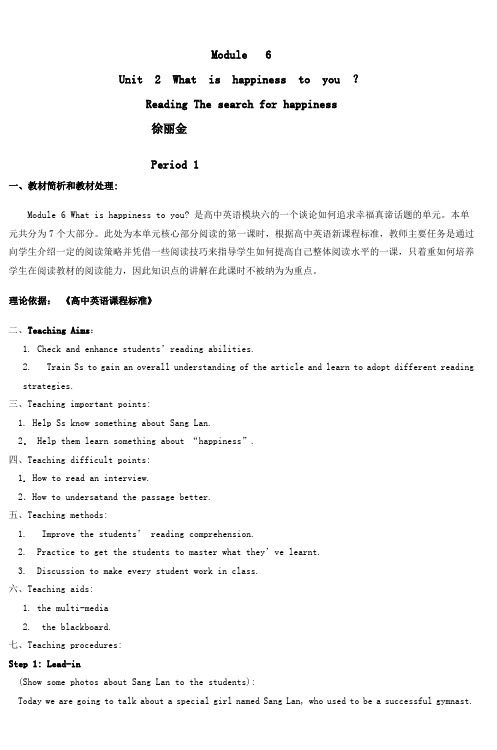
Module 6Unit 2 What is happiness to you ?Reading The search for happiness徐丽金Period 1一、教材简析和教材处理:Module 6 What is happiness to you? 是高中英语模块六的一个谈论如何追求幸福真谛话题的单元。
本单元共分为7个大部分。
此处为本单元核心部分阅读的第一课时,根据高中英语新课程标准,教师主要任务是通过向学生介绍一定的阅读策略并凭借一些阅读技巧来指导学生如何提高自己整体阅读水平的一课,只着重如何培养学生在阅读教材的阅读能力,因此知识点的讲解在此课时不被纳为为重点。
理论依据:《高中英语课程标准》二、Teaching Aims:1.Check and enhance students’reading abilities.2. Train Ss to gain an overall understanding of the article and learn to adopt different readingstrategies.三、Teaching important points:1.Help Ss know something about Sang Lan.2.Help them learn something about “happiness”.四、Teaching difficult points:1. How to read an interview.2.How to undersatand the passage better.五、Teaching methods:1. Improve the students’ reading comprehension.2. Practice to get the students to master what they’ve learnt.3. Discussion to make every student work in class.六、Teaching aids:1. the multi-media2. the blackboard.七、Teaching procedures:Step 1: Lead-in(Show some photos about Sang Lan to the students):Today we are going to talk about a special girl named Sang Lan, who used to be a successful gymnast.What do you know about this girl?Now let’s think about Sang Lan’s experience: Do you think Sang Lan had had a happy life before she was injured? Do you think Sang Lan has a happy life now? What would you do if you had the same problem? Suppose you had a chance to talk face to face with Sang Lan, what would you like most to ask her about?【设计说明】通过看图片和谈论,让学生走近桑兰,把学生很自然地引入到新课中,同时激发了他们学习课文内容的浓厚兴趣。
牛津高二英语Module 6 Unit2 Reading( 2 )

A small accident--- could have cost her----(p.18-19,lines 32-34)
cost:使付出代价,使丧失(某物)
Eg. 1.His lazy attitude ___ the boy his place in the team. 2.His mistake ___ him his life.
cost take describe finish rain rush
1.The baby’s crying ____ his mother many nights of s as a vintage car, but I’d call it an old wreck.
Unit 2 What is happiness to you?
Reading ( 2 )
Language points
序言
下载提示:该PPT课件是本店铺精心编制而成的,希望大家下载后,能够帮助大家解 决实际问题。PPT课件下载后可定制修改,请根据实际需要进行调整和使用,谢谢!
本编为大家提供各种类型的PPT课件,如数学课件、语文课件、英语课件、地理课件、 历史课件、政治课件、化学课件、物理课件等等,想了解不同课件格式和写法,敬请下载!
describe sb/ sth as sth.
Eg. 1. He __ __ __ (称他自己) a business executive; in fact, he is a clerk. 2. Weihua __ her school life in Britain __ interesting and exciting.
She was rushed to a top hospital--(p.19, lines 36-38)
- 1、下载文档前请自行甄别文档内容的完整性,平台不提供额外的编辑、内容补充、找答案等附加服务。
- 2、"仅部分预览"的文档,不可在线预览部分如存在完整性等问题,可反馈申请退款(可完整预览的文档不适用该条件!)。
- 3、如文档侵犯您的权益,请联系客服反馈,我们会尽快为您处理(人工客服工作时间:9:00-18:30)。
高二英语Module6 Unit2教案高二英语备课组Reading and Word power (Language points )1. search1) 名词搜查搜寻I went off in search of a garage where I could buy some petrol.The police continued a long search for the lost child.2) 动词 search sb./sth. forThey searched all the room for the missing papers.Scientists are still searching for a cure to the common cold.2. injure 伤害,损伤(主要指在事故中受伤); 损害,伤害(自尊,名誉等)He was badly injured in the accident.Smoking will injure your health.He injured his pride.3. struggle with1)动词He struggled with cancer for four years. 与……搏斗/斗争The shopkeeper struggled against the thief. 与……搏斗/斗争The two leaders are struggling for power. 努力争取;为了……而挣扎/努力We struggled through the crowd.2)名词Don’t give up without ~.Reading was a ~ for him. 阅读对他来说是件费劲的事。
4. times时代in ancient ~ in the ~ of Henrythe writers of the ~ ~ have changed.We had terrible ~. hard ~5. in hospital 住院 in the hospital 在医院里6. the world 世人们7. the way 方式 the way to do; the way of doing; the way (that/ in which)…I don’t like the way (that/in which) you laugh at her.People like the way he wrote his novels.8 ★ in case以防: if ;because it might happen or has happened that; so as to besafe if something happens~ he arrives before I get back, please ask him to waitTake your umbrella just ~ it rains/just ~ it should rain.★in case of 如果万一 (后接名词代词动名词)~ earthquake, crawl under the table.We can call for help ~ an emergency.★ in this/that case在这样/那样的情况下He may not be back at seven, ~ we want to leave.★ in any case 无论如何不管怎样~, I will come.★ in no case决不~ shall we allow smoking in the classroom..~ will we waste any time.★ in the case of就……来说Failure is no shame ~ a scientist.9. by: not later than; before与完成时连用~ the time the doctor arrived, the patient had died.~ next Friday, I ought to have finished the project.~ the end of this year, she will have been in Australia for two years.10. describe …as…把……描述成He ~d his school life as interesting and exciting.He ~s himself as a manager, in fact he is a clerk.11. could: might be possible (在这里) 表可能性The new project~ create 5,000 new jobs.The accident ~ have been prevented.12. cost: to lead to the loss of something 动词使……付出代价;花费1) His lazy attitude ~ th child his place in the team.2) The mistake ~ him his job.3) Writing a book ~s time and patience.4) The house ~ him $ 15000.13. rush1)不及物动词冲She rushed into the room.We have to ~ to the hospital.2)及物动词把……急忙送往~ the letter to the post officeHe ~ed his wife to the hospital.3)名词冲,抢购热潮~ hour Christmas ~14. ★ apart (adv.) (时间或空间上)分离;相隔;不在一起,分开1) The two hills are 22 miles ~. 两座山相隔22英里。
2) The workers took the machines ~. 工人们把机器拆了。
3) She keeps herself ~ from others. 她与其他人保持距离。
★~ from : besides1) ~ from some wine, he drank some beer. 他除了喝了些白酒以外,还喝了一些啤酒。
2) ~ from the dictionary, my sister gave a pen.15. devote … to …1) He ~d all his hours to working in the lab.2) This magazine is ~d to science.16. ★cheer up(使)高兴起来1) ~ ! things are not as bad as they seem.2) Flowers always cheer a room up.3) We have to cheer up the patients。
★ cheer 为……欢呼1) The boy cheered their team.2) The audience cheered him as he walked on the stage.17. spirits 复数be in good/high/low/bad ~1) He is in good ~.2)Your letter raised my ~.3) Do you believe in ~?4) fighting ~18. accomplish : completeI ~d the task.辨析:accomplish 成功地完成complete 强调某事结束了achieve 通过努力,克服困难,取得较大成绩e.g. 1) By spring they had completed the house and moved in.2) He hopes to achieve all his aims.19. adapt to sth.适应1) Our eyes adapted to the dark.2) Young people can ~ to new environment very quickly.3) It is difficult for him to ~ to the local weather.~ sth. to/for sth. 使……适应~sth. for sth. 改编;修改4) The plays were ~ed from novels.5) ~ oneself to a new job20. inspire 鼓舞;激励;;激发1) I hope this success will ~ you to great efforts.2) What ~s you to change your name?3) He ~d confidence in us.4) The memory of his mother ~d his best music.~dinspiringinspiration21. courage勇气不可数名词He had the ~ to speak up.That took ~.22. overcome overcame overcome克服We overcame difficulties.We were ~ by the heat.23. positive明确的;肯定的;积极的;确定的receive a ~ answer ~ evidencebe ~ of /about …be positive that从句…24. whenever : at whatever time ; at any timeI would like to see you ~ it is convenient.You may come and talk to me ~ you feel lonely.25. try my hardest尽力26. be jealous of 嫉妒某人John is jealous of his friend’s ability.Jealousy名词嫉妒She showed great ~ of them.27. have sympathy for/towards sb.同情某人We all have sympathy for himbe in sympathy with/out of 心里赞同/不赞同…I am in sympathy with your suggestion。
